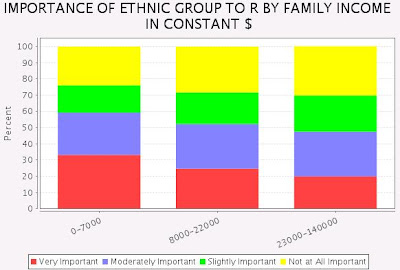
Sure enough, up through the first quarter of the 18th C., the Secretary at War's age hovers around 30. By the end of the century, his age has moved to the upper 30s and 40s. During the 19th C. there is more variance, with a handful of Secretaries in their early 30s, but the trend is still upward into the 40s and 50s. After 1900, the youngest has been 38, the oldest 73, with the average at 52. The men with heavy war responsibilities are about 20 years older in post-industrial than in pre-industrial times.
One reason may be that everyone started living longer with industrialization, not just the statesmen. But when you think about it, that cannot explain things. Presumably the 17th C. counterparts of today's lead singers of a rock band were also in their 20s. Elite athletes were likely also in their 20s, as they are today. If there were supermodels back then, you can bet they would have been in their 20s as well. Instead, there has been a shift in what type of people are considered fit for war secretary, which in turn reflects a change in the job description itself.
Violence and Social Orders, the book I'm reading, posits a framework for understanding history through the lens of controlling violence. In a primitive social order, such as those of hunter-gatherers, there is continual violence, no state, and mostly no social organizations beyond kin networks.
The limited access order (or "natural state") controls violence by using the state to create rents for elite members of a dominant coalition. Each elite gets his own piece of turf to extract rents from, and each elite respects the turf of the others because otherwise violence will break out, and that disorder would destroy the rent-creation. To make sure that the rents are sufficient to persuade elite members to refrain from violence, access to the elite is restricted -- if it were open, lots of people would pour in and shrink the amount of the rents going to each person. Still, the shadow of violence always looms over the society, since the means of violence are spread out over the entire elite -- not monopolized by the state -- and they only refrain as long as no one trespasses against them. The threat is always there.
Open access orders are the ones we live in today, where there is political control of the military, the state is used to provide public goods for the masses rather than private rents for the elites, and where the economically powerful earn their money through profits -- doing something productive -- rather than parasitizing rents from the peasants under their control. Violence is rare because the state monopolizes the legitimate use of violence, rather than every elite member being a violence specialist himself or closely allied with one. Elites compete on the basis of the price and quality of the goods and services they provide -- not based on who can defeat whom in a violent battle.
My guess for why open access orders have older statesmen is that since the shadow of violence has been largely removed, you don't need people running military affairs who are itching to pick up arms and go kick some ass. Being a hormone-crazed young person is great in a natural state -- your hair-trigger emotions are suited to a world where you always have to be prepared to fight, and your choleric temper provides a credible threat to would-be trespassers during peacetime. For example, Alexander the Great became King of Macedon at 20 and had conquered much of the known world by his death at 32.
But in open access orders, violence has been stripped from the broad elite and concentrated in the state, and civil war -- that is, intra-elite war -- is rare. So, too, are elite uprisings against the state -- before, these resulted from elites losing their rents and going after the people who were supposed to be providing them. So in these societies hot-headed young people are only going to threaten the peace. The elites are no longer constantly prepared to battle each other, so we only require a calm person to make sure everyone continues to get along. A 26 year-old in charge of the army, by contrast, would grow bored with peace so quickly that he'd want to stir things up "so we at least have something to do."
It's funny that we worry today about how to control young males' violent impulses, which threaten the peace. Only 300 years ago, we would have been grateful to have a young violent male in our social circle -- he would've been extracting rents from us, but at least we'd have someone to protect us from all those other specialists in violence. We truly live in a different world.









